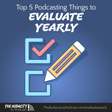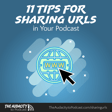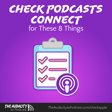
How to Stay Safe and Secure in Podcasting – TAP289
Internet security and privacy are deeply connected and important to your safety. Here are 17 tips to help you stay safe and secure in podcasting.
1. Prioritize your privacy
Transparency may seem great online, but this could be at the cost of your own privacy. Listen to my previous episode, “How to Protect Your Privacy While Podcasting,” for more information.
2. Maintain reasonable ownership
As much as possible, ensure you own or at least have significant control over the most important parts of your podcast:
- RSS feed—Do you own the URL? Can you redirect it whenever and wherever you want? Is the URL reserved so no one else can steal it?
- Domain—Always point people to your own domain, even if it merely points to somewhere else when you're starting out.
- Hosting—You could have more control by leasing a VPS or dedicated server. However you host your website and media, keep backups so that you can more easily move, if you must.
3. Use secure passwords
Weak passwords are one of the easiest ways for “hackers” to access anything. Generally, the harder a password is to speak, type, and remember, the better it probably is!
Secure passwords should be:
- Long—Use the maximum number of characters a site or service will allow
- Contain a mix of characters—Use numbers, uppercase and lowercase letters, and symbols
- Avoid anything from a dictionary—Words are easy to guess
- Not include anything personal—Birth dates, names, places, and such can all be figured out
The only passwords you need to know are the ones you must enter without a password manager. For example, your mobile device's password, your PC's password, or your password-manager's password.
4. Activate two-factor authentication everywhere
Two-factor authentication (often abbreviated “2FA”) is when a second device or method is required for authorization. This could be a link or code sent through email, SMS, postal mail, phone call, or other notification.
With 2FA, logging into a supported site or service on a computer would require not only the username and password, but also a code either generated by a different algorithm and available only on another device, or something sent to another location.
5. Make up answers to security questions
Darwyn, from Dealing With My Grief Podcast, commented on my episode about privacy:
One thing that I do to protect myself when setting up accounts, is to never use true information for the security questions… For example, if one of my security questions for the account is “What's your mother's maiden name?” or “Name of your first school?” my answer might be something like “Applesauce.” The information doesn't have to be true, just something to which you can provide the correct answer. With things like classmates.com, ancestry.com or a Google search, it's very easy to find the real answers to these questions.
You've probably seen those additional security questions that you can choose or customize. “Where were you born?” “What was your first car?” “Who was your first crush?” And so on. While some of these may be things only you know, it's probably more likely someone else could figure them out, especially with how transparent social networks make us.<



















